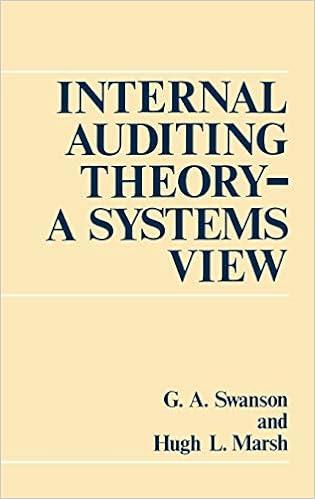Question
In which of the following scenarios would the primary beneficiary consolidate the variable interest entity under ASC 805 business combination accounting, similar to as if
In which of the following scenarios would the primary beneficiary consolidate the variable interest entity under ASC 805 business combination accounting, similar to as if consolidation was being required under a voting interest model.
a. The variable interest entity is a business that is under common control with the primary beneficiary.
b. The variable interest entity is not a business but is under common control with the primary beneficiary.
c. The variable interest entity is a business that is not under common control with the primary beneficiary.
d. The variable interest entity is not a business and is not under common control with the primary beneficiary.
After initial measurement, the assets, liabilities, and noncontrolling interests of a consolidated variable interest entity are subsequently measured and accounted for in which of the following ways?
a. Subsequent measurement is the same as if the variable interest entity were consolidated based on the voting interest model.
b. Combine the financial statements of each entity, ignoring intra-entity balances and transactions.
c. Combine the financial statements of each entitv. eliminatina anv intra-entity balances and transactions except for fees and other sources ot income between the primary beneficiaries and the consolidated variable interest entity.
d. Combine the financial statements at fair value.
Which of the following is a true statement related to applying Topic 805 Business Combination initial recognition and measurement principles in consolidating a variable interest entity?
O a. Leases and insurance contracts are classified based on terms and conditions at the initial consolidation date.
O b. The general measurement principle applied is fair value, with limited exceptions.
c. Any noncontrolling interests are not recognized.
d. Recognize a separate valuation allowance as of the initial consolidation date for assets measured at fair value (such as receivables).
Which of the following is an appropriate fair presentation concept related to a primary beneficiary's consolidation of a variable interest entity?
O a. Intra-entity balances are not eliminated, but are disclosed.
b. Separately report by natural classification all assets of each consolidated variable interest entity from those of the primary beneficiary.
c. Separately report by natural classification liabilities of a consolidated variable interest entity for which creditors do not have recourse to the general credit of the primary beneficiary.
d. Separate presentation of assets and liabilities of the consolidated VIE is not permitted.
Which of the following is a true statement related to ASU 2018-17 related to a nonpublic business entity's guidance for accounting for variable interest entities?
a. A nonpublic business entity is permitted to not consolidate any legal entity, including entities that it directly or indirectly has a controlling financial interest.
O b. A nonpublic business entity is prohibited from consolidating any variable interest entities.
c. As long as both the reporting business entity and the legal entity being evaluated for
consolidation as a variable interest entity are not public business entities, or are not under common control of a public consolidate variable interest entities.
d. The accounting alternative can be applied on a case-by-case basis for current and future entities under common control.
Step by Step Solution
There are 3 Steps involved in it
Step: 1

Get Instant Access to Expert-Tailored Solutions
See step-by-step solutions with expert insights and AI powered tools for academic success
Step: 2

Step: 3

Ace Your Homework with AI
Get the answers you need in no time with our AI-driven, step-by-step assistance
Get Started


